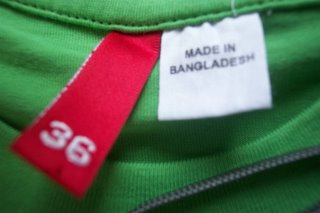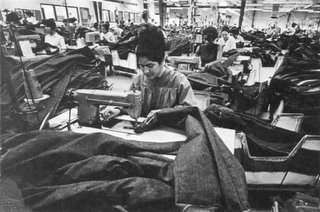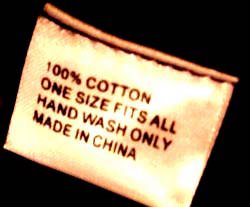Sweatshop Union.
i have been recently inspired by my good friend Sharelle to look into a subject i have slacked off on exploring recently.
look inside your clothes and look at the tag.
where was it made?
9 times out of 10, i bet it wasn't Canada.
instead...this is what we see.
(does anyone recognize that red tag?)

and do you know what that means>>>
it was made in a place like this.

Latin America, China, India, Bangladesh, Taiwan...
these are the places our clothes are being made.
I think there are points to be argued both ways - but what i'm looking to find is consistency.
buy purchasing these clothes, we are:
i have been recently inspired by my good friend Sharelle to look into a subject i have slacked off on exploring recently.
look inside your clothes and look at the tag.
where was it made?
9 times out of 10, i bet it wasn't Canada.
instead...this is what we see.
(does anyone recognize that red tag?)

and do you know what that means>>>
it was made in a place like this.

Latin America, China, India, Bangladesh, Taiwan...
these are the places our clothes are being made.
I think there are points to be argued both ways - but what i'm looking to find is consistency.
buy purchasing these clothes, we are:
- feeding money into an economy that, i think it's safe to say, needs the money more than we do.
- creating jobs for thousands of people that have little else to sustain them.
so are we doing our good deed for the day by going shopping and looking for a tag like this one?
certainly not.
what is the answer here? How can be we be consistent with our concern for people from third world countries yet support our own country's economy?



4 Comments:
RED TAG! H&M!
interesting dilemma indeed. How does one remain consistent? You could make your own clothing...(keeping in mind that much of the textiles and fabric you might use may still be made in places other than Canada) Devote yourself to American Apparel...(annnd spend a hell of a lot more money on clothes that you may think necessary) I suppose in the end it comes down to teaching ourselves that we need less. Although, I will say this, there are certainly coorporations, such as Ikea in fact, who do a great job of monitering the factories in which their products are made in order to ensure wages and health standards...so that's good.
Ok. You've touched on a dizzying issue. When we purchase an item at H&M, that most tempting hub of low prices and great style, we are commiting a multitude of ignorant, yet active, sins not only against the immpoverished who made the item, but against the entire global community. Lord! Have you ever thought about the pollution generated everyday by transcontinnental transportation of our essentials, as well as our frivolities? Now, our concern should go beyong clothes. What was the last thing you ate? Do you know where it came from? Under what circumstances it was grown, packaged, transported? No, you don't. The spirit of Capitalism tells us that the Third World, or "Developing World", needs to work for us, so that they can "come up to our level". They need to convert there sustainable farms into feedlots, and biocide depentant monocultures. Really, we're doing them a favor by helping their children feel shame of thier heritage, and lust for the fulfillment of Western commodification, and comsuption, not to mention the carcinogens and endocrine disrupters that go along with their "developed" mode of farming. Here's the truth: there is no possible fricken way that our earth can sustain 5.7 billion people living, even at our lowest, North American standard. And the earths' population is growing. We have to change our standards. We say, "oh, those poor starving Africans! what can be done, there land is all turning into desert." Yeah, it is, because as the demand for more and more transportation of goods, produces more and more carbon dioxide, the earth is getting hotter, and the deserts bigger. Alas, as i said above: dizzying. i haven't scratched the surface of the reprecussions of our daily purchasing decisions. Good news is there is a growing awareness, which equals a growth in alternatives. If you look, you can find local,organic, free range, pasturzed, ect., where on a few years ago, no one cared two hoots how there food was produced. One last thing to consider: what is the real cost of an H&M tee-shirt?
indeed foreign textile factory workers need the people in the purchasing country to take a stand for the right of fair wages and safe working conditions. but to deny a Bangali woman of the oppourtunity to earn her own wages and experience freedoms that she might not otherwise experience also seems unfair. no real easy answer.
Post a Comment
<< Home